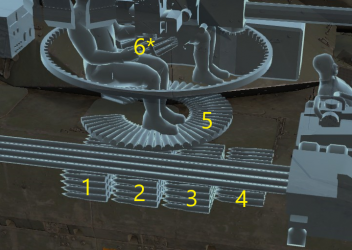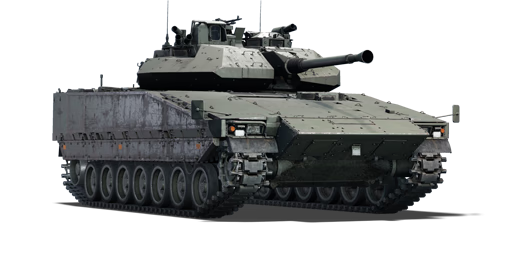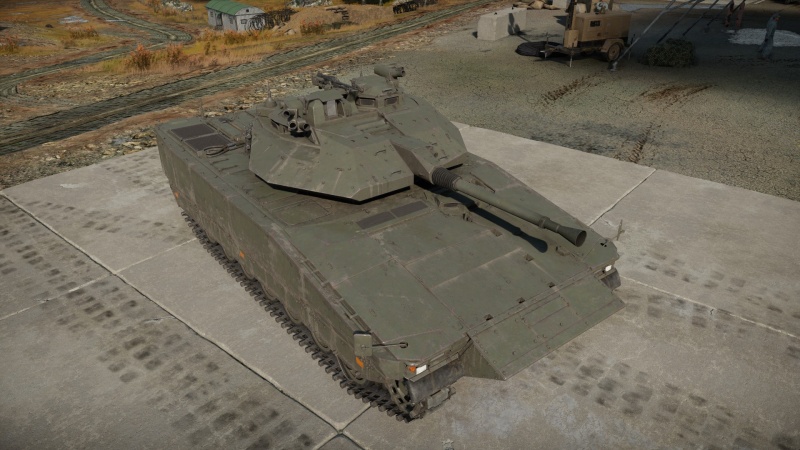Difference between revisions of "Strf 9040C"
m |
R_nminbiY_n (talk | contribs) |
||
| Line 215: | Line 215: | ||
</references> | </references> | ||
| + | {{TankManufacturer BAE Systems AB}} | ||
{{Sweden light tanks}} | {{Sweden light tanks}} | ||
Revision as of 03:59, 10 May 2022
| This page is about the Swedish light tank Strf 9040C. For other versions, see CV90 (Family). |
Contents
Description
The Stridsfordon 9040C is a rank VII Swedish light tank with a battle rating of 10.0 (AB/RB/SB). It was introduced in Update 1.97 "Viking Fury".
The Strf 9040C is a Swedish IFV capable of firing modern shells at a devastating rate, effectively dealing with any type of opponent it faces, resulting in a valuable support vehicle.
General info
Compared to most IFVs found in the game, the Strf 9040C is a lot different to its peers. The tank has no Anti-tank missiles, and sits at the highest ranks, facing vehicles other IFVs never get to experience. This is due to the design of the vehicle, as the Strf 9040C features a reliable 40mm Bofors cannon, which should be familiar to most players. However, this cannon features something unlike any other 40mm. The vehicle fires sub-caliber shells with fin-stabilization, capable of shredding any opponent from the side, even frontally. This compensates for the lack of missiles, and results in a highly versatile vehicle capable of disposing several opponents at once, as it can fire up to 24 shells in the span of 12 seconds.
If the anti-tank capabilities weren't enough, the cannon features Proximity-fused High-explosive shells, capable of tearing apart any unsuspecting aerial opponent. This feature is incredibly useful in higher tiers, as close-range helicopters and attacking planes are incredibly common. Despite the Strf 9040C lacking any form of radar equipment compared to its SPAA sister, the Lvkv 9040C, the tank can still effectively deal with aerial targets, especially at closer ranges.
Survivability and armour
The tank has a decent amount of armour for a light Tank. The tank is nearly completely covered with composite screens effective against chemical rounds.
The upper front hull is a heavily sloped 20 mm thick plate covered with composite screens. The lower plate is 20 mm thick and only covered on the upper half with a composite screen. In the front of the vehicle is located the engine and transmission that can absorb any round that may go trough the composite screen. Between the engine and the crew compartment stands a 10 mm thick inner plate that stops most shrapnels that could come from a penetrating shell. The upper side has an outer 6 mm plate and an inner 10 mm plate, both behind a 160 mm composite screen. The lower side has only a 10 mm thick plate that is partly behind the sprocket system that ads another 30 mm and also behind a 80 mm thick composite screen. The rear of the hull is only a 20 mm thick plate.
The turret is completely covered in 20 mm RHA plates except for the gun mantlet that is 35 mm thick. The Turret is covered from the front to 2/3 of the sides vwith composite screens. The turret roof is only 20 mm thick.
Armour type:
| Armour | Front (Slope angle) | Sides | Rear | Roof |
|---|---|---|---|---|
| Hull | ___ mm | ___ mm Top ___ mm Bottom |
___ mm | ___ - ___ mm |
| Turret | ___ - ___ mm Turret front ___ mm Gun mantlet |
___ - ___ mm | ___ - ___ mm | ___ - ___ mm |
| Cupola | ___ mm | ___ mm | ___ mm | ___ mm |
Notes:
Mobility
| Game Mode | Max Speed (km/h) | Weight (tons) | Engine power (horsepower) | Power-to-weight ratio (hp/ton) | |||
|---|---|---|---|---|---|---|---|
| Forward | Reverse | Stock | Upgraded | Stock | Upgraded | ||
| Arcade | 78 | 51 | 28.5 | 852 | 1,049 | 29.89 | 36.81 |
| Realistic | 70 | 46 | 486 | 550 | 17.05 | 19.3 | |
Modifications and economy
Armaments
Main armament
| 40 mm akan m/70B | Turret rotation speed (°/s) | Reloading rate (seconds) | ||||||||||||
|---|---|---|---|---|---|---|---|---|---|---|---|---|---|---|
| Mode | Capacity | Fire rate | Vertical | Horizontal | Stabilizer | Stock | Upgraded | Full | Expert | Aced | Stock | Full | Expert | Aced |
| Arcade | 234 | 300 | -8°/+35° | ±180° | Two-plane | 33.2 | 46.0 | 55.8 | 61.7 | 65.7 | 0.20 | 0.20 | 0.20 | 0.20 |
| Realistic | 20.8 | 24.4 | 29.7 | 32.8 | 34.9 | |||||||||
Ammunition
| Penetration statistics | |||||||
|---|---|---|---|---|---|---|---|
| Ammunition | Type of warhead |
Penetration @ 0° Angle of Attack (mm) | |||||
| 10 m | 100 m | 500 m | 1,000 m | 1,500 m | 2,000 m | ||
| slpprj m/90 | APFSDS | 143 | 142 | 137 | 130 | 123 | 116 |
| slsgr m/90 | HE | 5 | 5 | 5 | 5 | 5 | 5 |
| kulsgr m/90 | HE-VT* | 5 | 5 | 5 | 5 | 5 | 5 |
| slpprj m/01 | APFSDS | 170 | 168 | 162 | 154 | 146 | 138 |
| Shell details | |||||||||
|---|---|---|---|---|---|---|---|---|---|
| Ammunition | Type of warhead |
Velocity (m/s) |
Projectile Mass (kg) |
Fuse delay (m) |
Fuse sensitivity (mm) |
Explosive Mass (TNT equivalent) (g) |
Ricochet | ||
| 0% | 50% | 100% | |||||||
| slpprj m/90 | APFSDS | 1,465 | 0.5 | N/A | N/A | N/A | 78° | 80° | 81° |
| slsgr m/90 | HE | 988 | 0.96 | 0 | 0.1 | 174.4 | 79° | 80° | 81° |
| kulsgr m/90 | HE-VT* | 1,015 | 0.88 | 0 | 0.1 | 190.8 | 79° | 80° | 81° |
| slpprj m/01 | APFSDS | 1,495 | 0.53 | N/A | N/A | N/A | 78° | 80° | 81° |
Ammo racks

| Full ammo |
1st rack empty |
2nd rack empty |
3rd rack empty |
4th rack empty |
5th rack empty |
6th rack empty |
Visual discrepancy |
|---|---|---|---|---|---|---|---|
| 234 | 186 (+48) | 138 (+96) | 90 (+144) | 72 (+162) | 24 (+110) | 0 (+234) | No |
Machine guns
| 7.62 mm ksp 58 | ||||
|---|---|---|---|---|
| Mount | Capacity (Belt) | Fire rate | Vertical | Horizontal |
| Pintle | 2,000 (250) | 600 | -8°/+20° | N/A |
Usage in battles
Flanking or very carefully aimed shots are key as none of the 9040C's ammo types can penetrate the frontal armour of most MBTs found at the BR, but its high rate of fire means that penetrations are quickly lethal. Since the magazine carries 24 rounds, it is advisable to fire the weapon in burst of either four or eight rounds with an interval of 2 - 4 seconds in between, especially at range.
However, the vehicle's low armour and relatively average speed mean that patience and caution will be what keep you alive long enough to actually get those kills.
Pros and cons
Pros:
- Rapid-fire 40 mm gun with APFSDS
- Shreds enemy tanks from the sides
- HE-VT useful against helicopters
- Very mobile
- Low profile
- Deadly in flanking manoeuvres
Cons:
- Susceptible to overpressure
- Speed not too impressive when compared to other top tier tanks
- Slpprj m/01 modification with an rather expensive ammo cost per round that will add up
History
In 1983, the Combat Vehicle 90 group was created by representatives from many Swedish producers for high mobility vehicles with air defence and anti-tank capabilities in mind. In 1985, the chassis saw development and the first orders for the 40 mm Bofors cannons were done. A year later, in 1986 the prototypes for the Strf 9040 and Strf 9025 were ordered. The prototypes arrived in 1988. The vehicle entered full production in 1993 and is still produced to the present day.[1]
Media
- Skins
- Videos
See also
Links to the articles on the War Thunder Wiki that you think will be useful for the reader, for example:
- reference to the series of the vehicles;
- links to approximate analogues of other nations and research trees.
External links
References
- Citations
| BAE Systems AB | |
|---|---|
| Light Tanks | |
| CV90 | Strf 9040B · Strf 9040C · Strf 9040 BILL · CV 90105 · CV 90120 |
| MBTs | |
| Strv 122 | Strv 122A · Strv 122B PLSS · Strv 122B+ |
| SPAA | |
| CV90 | Lvkv 9040C |
| See Also | AB Bofors · Hägglund & Söner · KMW |
| Sweden light tanks | |
|---|---|
| L-60 | Strv m/38 · Strv m/39 · Strv m/39 TD · Strv m/40L |
| Strv m/41 | Strv m/41 S-I · Strv m/41 S-II |
| Ikv 91 | Ikv 91 · Ikv 91-105 |
| CV 90 | Strf 9040B · Strf 9040C · Strf 9040 BILL |
| CV 90105 · CV 90120 | |
| Wheeled | Pbil m/40 · U-SH 405 |
| Other | Strv m/31 · Strv 74 · Pbv 501 |
| Finland | Vickers Mk.E · ▄T-26E · BT-42 · ▄PT-76 · CV9030FIN · CT-CV 105HP |
| Denmark | CV9035DK |





